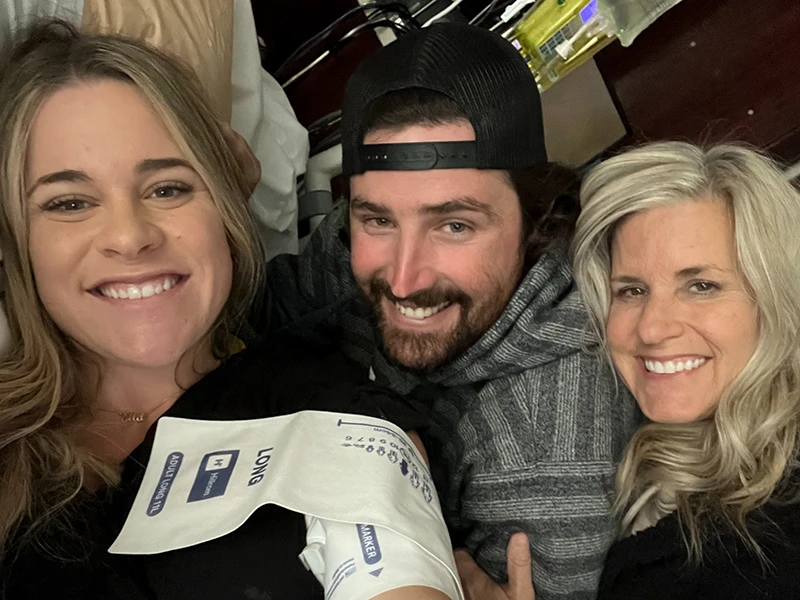I Couldn’t Fix This
When you can’t give your daughter the one thing she wants… a baby
By Dana Martin
“What do you mean you can’t get pregnant?”
The words would not compute in my Gen-X brain when my daughter, Jaisyn, explained why she had so many doctor appointments. It sounded like a foreign language. Back in my day (how trite), but back in my day, 35-years ago, nobody in my circle of family or friends had any trouble conceiving.
We had trouble staying un-conceived.
“I don’t know. I’m trying to figure it out,” she said and shrugged, thereby beginning our long trek through the infertility journey.
Back then, I didn’t know yet how long this journey would be. In fact, I may have even appeared aloof or indifferent because in my experience, anyone could get pregnant. Was she being dramatic? “It’ll pass,” I thought, expecting to hear the good news soon.
It’ll pass?
It didn’t pass. The process many young women must endure now to conceive a baby is just short of barbaric. What has happened in the span of one generation? Five years after that initial conversation, infertility is a household word (especially in my house), and I have watched with shock and painful empathy as my precious girl has fought to get babies into her womb and keep them there.
I have taken tearful phone calls as she experienced fear and uncertainty over the decision to take each step in the fertility process.
I have witnessed the toll that the appointments, shots, surgeries, procedures, finances, and disappointments have taken on her peace and on her marriage.
No, it didn’t pass.
I have stayed stoically silent or perpetually upbeat when she gave me the news that she was no longer pregnant. Twice.
Later, alone, tears ran down my face. I never thought I’d hear the word “miscarriage” and had no idea how deeply her losses would gut me. I grew up so naïve; nobody I knew in my youth had suffered a miscarriage, and now they seem commonplace.
Then, I did the unthinkable: When my daughter announced that her only male fertilized egg had been successfully implanted, I ordered his Christmas stocking. I did hesitate briefly—only briefly— thinking, “What if…?” But no, I carried on with the dumb plan, had the stocking embroidered with the name she’d been planning for years, and even went as far as hanging it on the mantle.
I should have hesitated longer.
Infertility is brutal and cruel.
When the phone rang at midnight, Rob and I ran out of the house wearing slippers and robes. I explained as we drove that Jaisyn needed to go to the emergency room. We might be losing our little boy.
“Like, a miscarriage?” he asked, confused. There was that word again. At this point, I had to explain at greater length everything our daughter had experienced. We had sheltered him from many of the painful details.
“Yes, dear,” I said. “But please don’t say too much. We don’t know anything yet for sure.”
But his face said it all when he walked into her home and saw her gripping her stomach. This night would not end well.
Suddenly, I was panicked and helpless. I couldn’t fix this. Worse, what if I’d caused it? Her infertility was suddenly very real and—in truth—I began obsessing over what I had done wrong.
Why couldn’t my daughter get pregnant? My son’s wife can. I did. My birthmother had so many kids she started giving them away. So, why this? I racked my brain:
What did I feed her, let her drink? Was it the cleaners I used? The candles I burned? The laundry detergent or the baby shampoo? What about the stupid sunscreen?! Great, I had a clean house— but at the expense of my daughter’s future family. What did I do to alter her reproductive future? It had to be something I did. I had been in charge of EVERYTHING.
There are a lot of theories about why the sudden uptick in infertility, along with cleaner choices now for food, drinks, and household products (which begs the question about our “dirty” products of the 90s), but what was it? We don’t know. We won’t know. I still don’t have the answers to the questions that haunt me, and that’s OK.
What we have, though, are healthy grandchildren now, conceived in the way God knew they would come into this world. We grieve the losses, but nothing takes God by surprise; He knew all along that it would come to this and gifted us this medical workaround to contend with whatever is causing such widespread reproductive chaos.
Our family is full and healthy, and we thank God, physicians, science, (mostly God) and the faith of Keith and Jaisyn—who never gave up on the dream God put in their hearts to be a daddy and a mama.
And they are good ones. Multiple times over.

